At the Aspen Institute Economic Opportunities Program, we believe that confronting the inequities that divide us along the lines of race, gender, ethnicity and geography, restoring the promise of work, and broadening opportunities to participate in business ownership are essential to building a more free, more just, and more equitable world. Below we share our monthly newsletter with highlights of recent work. As always, we welcome your feedback, thoughts, and partnership in advancing inclusive opportunity and an economy in which we all can thrive. Click here to subscribe.
Click here to view past editions of our newsletter
Upcoming Events
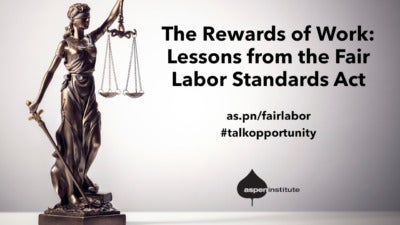
April 7 – The Rewards of Work: Lessons from the Fair Labor Standards Act
The Fair Labor Standards Act of 1938 improved job quality for hundreds of thousands of workers. But it excluded many from the start, and its impact has diminished over time. How can we create a more just economy that rewards work fairly? Join us for a virtual discussion on Thursday, April 7, from 2:00-3:15 p.m. EDT, featuring Rebecca Dixon (National Employment Law Project), Michael Lastoria (&pizza), Teresa Romero (United Farm Workers), Ben Zipperer (Economic Policy Institute), and Noam Scheiber (The New York Times). Click here to register.
Tweet I’m excited to #talkopportunity with @RebeccaDNELP, @__lastoria, @UFWPresident, @benzipperer, and @noamscheiber about the Rewards of Work and the Fair Labor Standards Act. Join me for this @AspenJobQuality event. April 7 at 2 pm ET (11 am PT).
This event is the second in our five-part discussion series on The History and Future of U.S. Labor Law: Conversations to Shape the Future of Work. Join us to learn about and reflect on the history of U.S. labor law, examine current implications and challenges, and discuss how we shape a future of work that provides opportunity and dignity to all.
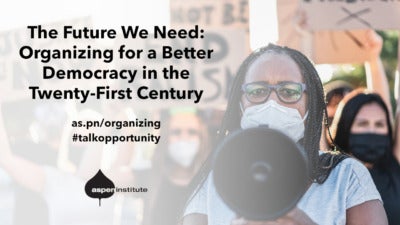
April 19 – The Future We Need: Organizing for a Better Democracy in the Twenty-First Century
The US is at a crossroads. We face threats to democracy, an ongoing battle against discrimination and hate, and the simmering resentment of growing numbers of people who work hard but find a middle class life out of reach. Now, workers, communities, and businesses are all organizing for change. In their new book, The Future We Need: Organizing for a Better Democracy in the Twenty-First Century, authors Erica Smiley (Executive Director, Jobs With Justice) and Sarita Gupta (Vice President of U.S. Programs, Ford Foundation) argue that collective bargaining can improve work, address discrimination, and enhance the health of our democracy. Join us for a virtual book talk on Tuesday, April 19, from 1:00-2:00 p.m. EDT, featuring Smiley, Gupta, and moderator Rick Wartzman (Head of the KH Moon Center for a Functioning Society, Drucker Institute). Register now.
Tweet I’m excited to #talkopportunity with @saritasgupta @FordFoundation, @SmileyJWJ @jwjnational, and @RWartzman @DruckerInst about organizing for a better democracy. Join me April 19 at 1 pm ET for this virtual event by @AspenBizSociety and @AspenJobQuality.
News and Updates
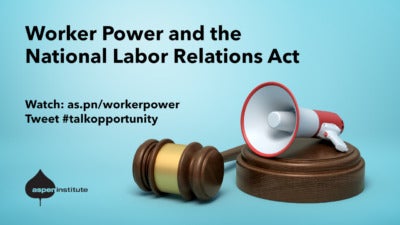
The History of the National Labor Relations Act and the Future of Worker Power
What can the history of worker power teach us about its future? On March 16, we hosted a public discussion on Worker Power and the National Labor Relations Act, featuring opening remarks from US Labor Secretary Marty Walsh, followed by a panel discussion with Roy Bahat (Bloomberg Beta), Jennifer Epps (The LIFT Fund), Dr. Annelise Orleck (Dartmouth College), and moderator Charisse Jones (USA Today). A recording is now available in video, audio, and transcript formats, as well as a full recap with clips and insights from speakers.
Tweet Headlines are filled with stories of strikes and union drives. How will the NLRA affect workers’ right to organize? Hear insights from @SecMartyWalsh, @roybahat, Jennifer Epps, @AnneliseOrleck1, and @charissejones.

The US Labor Shortage Is the Deserved Outcome of a Systemic Failure To Value Workers
Facing a “labor shortage” and the Great Resignation, many businesses are wondering where workers have gone. The answer isn’t complicated, notes EOP Executive Director Maureen Conway in Quartz. Let’s look at what happened to workers over these last two years. And then let’s consider what happened to work over the past several decades. The pandemic was simply the coda to decades of declining wages and working conditions. The best way to bring people back to work is to make work better. That is the urgent challenge before us. Read more.
Tweet While businesses fret about the #laborshortage, inflation, and #GreatResignation, let’s look at what happened to workers. The trauma of the pandemic followed decades of declining wages and working conditions. Read more from @conway_maureen in @qz.

How Contract Work Drives Disparities in Tech
Job quality crisis is a structural problem, and it’s reflected in the way that work is arranged. Many who work in the tech sector, for example, are temporary, contract, and contingent workers who have been locked out of its growing prosperity. In a post on the Aspen Institute blog, Future of Work Initiative Senior Fellow Natalie Foster draws on findings from a new report by TechEquity Collaborative, where she serves as an advisor. The Contract Worker Disparity Project provides one of the first comprehensive looks at inequities in tech contract work. Despite performing critical roles, contract workers—who are disproportionately people of color—tend to receive lower pay and fewer benefits than directly employed workers, contributing to occupational segregation. Read more.
Tweet The reality is that many who work in tech—temporary, contract, and contingent workers—have been largely locked out of tech’s prosperity despite performing critical roles for the companies. Read more from @nataliefoster of @AspenFutureWork.

Developing Digital Fluency to Advance Equity: The Case of Austin Community College
For millions of workers and business owners, navigating digital platforms can be a daily struggle. As digital tools become increasingly central to our work and lives, we must provide the training needed to support our emerging and incumbent workforce. In a post on the Aspen Institute blog, Latinos & Society Program (AILAS) Senior Research Manager Diego Deleersnyder and Executive Director Domenika Lynch cite the example of Austin Community College, which is leading the way on digital skills training for Latinos and other students of color. UpSkill America is proud to be partnering with AILAS on our Digital Skills and the Latino Workforce project, which seeks to learn how digitalization and automation of work impact Latino frontline workers and Latino-owned businesses across sectors. Read more. You can look for the Digital Skills and the Latino Workforce project report, coming in April.
Tweet #Upskilling efforts must strive to ensure that all workers can thrive in the workplaces of today and tomorrow. Learn about @accdistrict’s inclusive approach to advancing #digitalskills for Latino students.
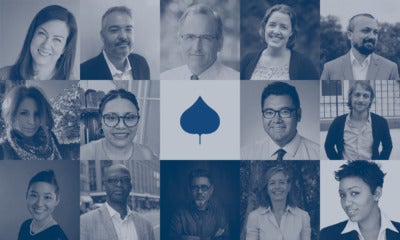
Job Quality Fellows Begin Work
The new Job Quality Fellows (JQF) began initial working sessions in March. “This is a very diverse and accomplished group of leaders from across workforce development and worker advocacy and organizing,” noted EOP Executive Director Maureen Conway. “The fast start they’ve set through virtual meetings is encouraging and impressive.” Through online meetings —on March 22nd, 24th, and 29th— the Fellows became familiar with each other, surfaced intersections in their work, set expectations for the Fellowship experience, and shared their goals for the program. Fellows will meet at the Aspen Institute’s Washington DC headquarters in May. To learn more about the 2022-23 class of Fellows, read their announcement and visit their profiles. EOP selected the fourteen Fellows in late February. This is EOP’s third JQF class after launching the initiative in 2017.
Tweet From strikes to union drives to the #GreatResignation, working people are demanding better. They deserve improved #jobquality. The new @AspenJobQuality Fellows are committed to making it happen—through workforce development, organizing, and advocacy.

Phoenix Workforce Leaders Reflect on Fellowship Experience
This month, Greater Phoenix Workforce Leadership Academy (WLA) Fellows – now alumni – shared with us reflections on their experiences in the Academy. One Fellow noted that, in addition to fruitful collaborations with organizations from new areas of the workforce ecosystem, “networking with key leaders in the Greater Phoenix community has been the biggest benefit” of participating in the WLA. “COVID has resulted in more virtual meetings, limiting the accidental encounters with new thought partners,” so, by bringing together “[20] strangers who are vested in serving the same community to make an impact,” this Academy filled a critical gap. On how collaboration can foster synergy, another Fellow appreciated that “you will learn ways to ‘connect the dots’ between ideas and services to build a bigger picture [that benefits] everyone touched by your organization’s mission.” A number of Fellows highlighted their personal leadership growth during the Academy, including newfound optimism about the goals that local workforce strategies can achieve. One Fellow shared: “After completing the Academy, I will continue to work with other funders to explore ways of supporting DEI in our communities and look for opportunities for collaboration.” On that note, stay tuned for next month’s profile on a mini collaborative project that arose from the Greater Phoenix WLA! Click here to meet the Fellows.
Tweet Fellows in the Greater Phoenix Workforce Leadership Academy—a partnership between @arizonafuture and @AspenJobQuality—work to improve local economic mobility and create innovative solutions to the challenges faced by workers and businesses.
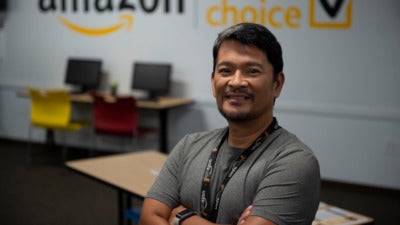
Updates from UpSkill America
In upskilling news, PepsiCo announced a new debt-free education platform for employees, Amazon added more than 140 colleges and universities to its upskilling program, and the Milken Center for Advancing the American Dream and Coursera launched The American Dream Academy, which will provide free certified skills training to 200,000 underserved Americans to advance social and economic mobility in the digital economy. We’re pleased to see companies remain committed to the upskilling movement during what continues to be an uncertain time in our economy and society. Stay tuned for more upskilling news, and contact us for information on how you can join the upskilling movement.
Tweet .@AdvanceTheDream and @coursera recently launched The American Dream Academy, which will provide free skills training from companies like @Google, @IBM, and @Meta to 200,000 underserved workers.
EOP On the Road
EOP staff are available for speaking and media engagements. Learn about our team and contact us for information.
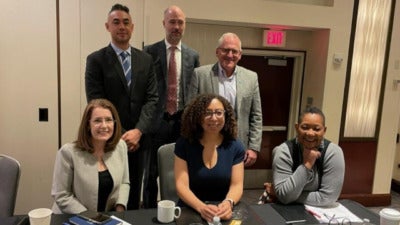
Maureen Conway Talks Workforce with San Diego Regional Chamber of Commerce
On March 29, EOP Executive Director Maureen Conway spoke on a panel on workforce issues at the San Diego Regional Chamber of Commerce 2022 Mission to Washington D.C. The event began with introductory remarks from Sean Elo-Rivera, council president for the City of San Diego. Conway then spoke alongside Angela Hanks (Principal Deputy Assistant Secretary, Employment and Training Administration) and Kim Mitchell (Vice President, Program Strategy, NPower) in a panel discussion moderated by San Diego Workforce Partnership CEO Peter Callstrom—one of 14 newly minted Job Quality Fellows.

Shelly Steward Talks Women, Gig Work, and the Great Resignation
Women endured an outsize impact from the pandemic, leaving the workforce in greater numbers than men and turning increasingly to unstable gig work. While gig work can provide flexibility in scheduling, it offers low, unpredictable wages and few, if any, benefits. On March 29, Future of Work Initiative Director Shelly Steward spoke to this tradeoff at the YMCA of Greater Seattle. In an event titled, “The Great Resignation and its Impact on Women,” Steward discussed “the disproportionate impacts of the Great Resignation, pursuit of work-life balance, and the long-term implications of women workplace departure globally.” Click here to learn more.
On March 31, Steward spoke about the gig economy and the challenges it presents to workers at a session of the Interfaith Center on Corporate Responsibility Spring 2022 Conference, which highlighted growing interest from investors in fair labor practices. The discussion, “Worker Rights in the Gig Economy,” also included remarks from Manny Ramirez (Organizer, Los Deliveristas Unidos), Hildalyn Colón Hernández (Director of Policy & Strategic Partnerships, Los Deliveristas Unidos), and Claire Ahlborn (Engagement Specialist, Robeco).
We will share a recording of these discussions if they become available.
Join the conversation
Follow EOP on social media to join the conversation!
-Job quality updates from EOP @AspenJobQuality
-Business Ownership Initiative @Aspen_BOI
-UpSkill America @upskillamerica
-Future of Work Initiative @AspenFutureWork
About EOP
The Aspen Institute Economic Opportunities Program (EOP) advances strategies, policies, and ideas to help low- and moderate-income people thrive in a changing economy. We recognize that race, gender, and place intersect with and intensify the challenge of economic inequality and we address these dynamics by advancing an inclusive vision of economic justice. For over 25 years, EOP has focused on expanding individuals’ opportunities to connect to quality work, start businesses, and build economic stability that provides the freedom to pursue opportunity. For more information, visit as.pn/eop.
EOP has several initiatives, including the Business Ownership Initiative, Workforce Strategies Initiative, UpSkill America, Good Companies/Good Jobs, and the Future of Work Initiative. In addition, across these approaches EOP hosts the Economic Opportunity Fellows Network and the Opportunity in America event series.
Thank you to our many partners and funders for supporting our efforts.
Support Our Work
We are committed to making our events and publications freely available to everyone who finds them useful. But if you find value in our work and are able to support it, please consider making a tax-deductible donation. Click here to learn more.
Keep in Touch
Click here to join our mailing list. For updates every day, follow us on social media.

